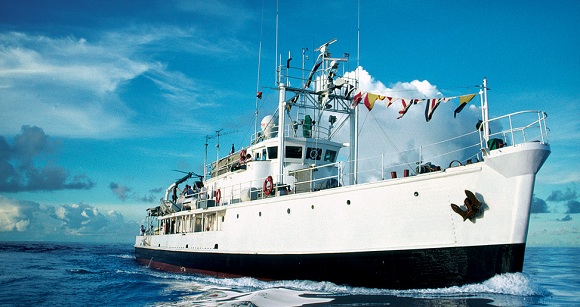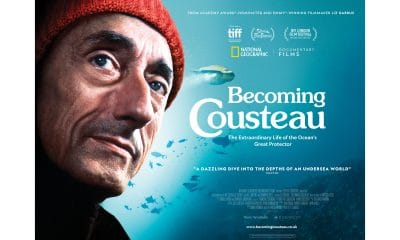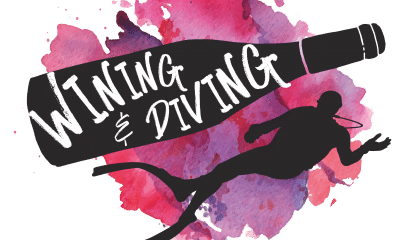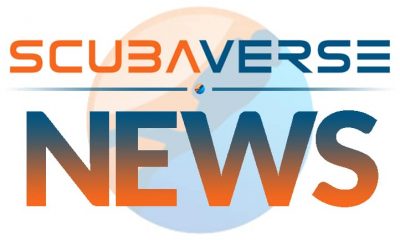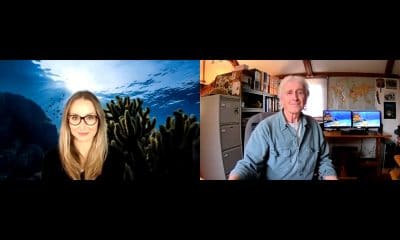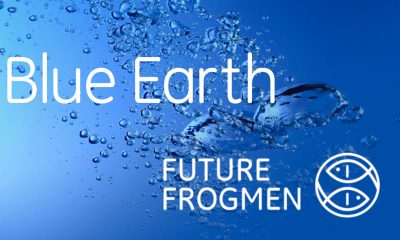News
Jeff Goodman Interviews author Richard Hyman
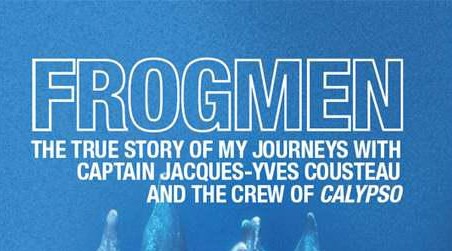
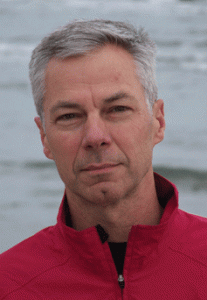 On the front page of author Richard Hyman’s website it reads:
On the front page of author Richard Hyman’s website it reads:
In his personal account of SCUBA diving with Jacques Cousteau, Richard Hyman takes us behind the scenes with Cousteau’s diving team, inside the legendary ship Calypso, and under the sea to some of the world’s most breathtaking underwater SCUBA diving locations. Frogmen is an inspiring adventure that pays homage to one of the greatest explorers and visionaries of all time, Captain Jacques Cousteau.
Cousteau was a childhood hero of mine. His TV programmes enthralled me through my younger years and teens. His adventures aboard the legendary ship Calypso were an inspiration which finally led me to become an underwater cameraman and film maker. I always wondered what it would have been like to be part of his crew, exploring the oceans of the world, testing new technologies… a life of true adventure.
I asked Richard what inspired him to write Frogmen.
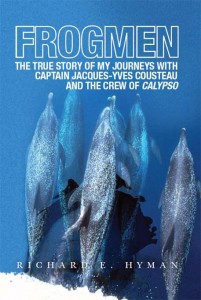 Richard: I really wanted to tell my story. For years I talked about writing the book. Then one day my wife took my journals and typed them all up for me. That was very kind of her. That was the spark. By the way, without the journals, there’s no way I could have written the book. I was busy with my career and my family. It actually took ten years to write it.
Richard: I really wanted to tell my story. For years I talked about writing the book. Then one day my wife took my journals and typed them all up for me. That was very kind of her. That was the spark. By the way, without the journals, there’s no way I could have written the book. I was busy with my career and my family. It actually took ten years to write it.
Three things inspired me. First I wanted to do my little part to try and keep Captain Cousteau’s legacy alive, particularly with the younger generations. Second, I wanted to keep his important environmental messages alive. Finally, I wanted to inspire people of all ages to have their own adventure. Not everybody gets to work with Jacques Cousteau on Calypso, but when that once in a lifetime opportunity comes along, just do it.
Jeff: How old were you when you joined Cousteau’s team and how did it come about?
Richard: I had just turned 18 years old. I’d just graduated from High School. My father, Fred Hyman, was heading to Los Angeles for a business meeting with Captain Cousteau. Dad asked if I’d like to come along. I said yes.
That July we flew from New York to L.A. Jacques Cousteau and his son Philippe picked us up at LAX and we drove to the Cousteau office.
Dad was actually Cousteau’s business partner. He’d been recruited to come in and turn things around. The business was in trouble and Dad saved it.
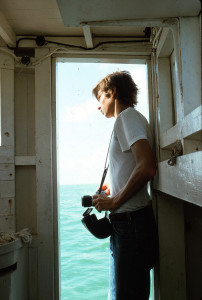 One of the great things that came out of their collaboration was The Cousteau Society. Dad was a co-founder, along with Jacques, Philippe and Jean-Michel Cousteau.
One of the great things that came out of their collaboration was The Cousteau Society. Dad was a co-founder, along with Jacques, Philippe and Jean-Michel Cousteau.
As Dad had his meeting, I checked out the amazing photographs on the walls and on a large lighted table for sorting slides.
After work we went to Philippe’s house. Dad and I were staying with Philippe. Philippe actually gave me my first SCUBA lesson right there in his pool overlooking a beautiful view of the L.A. area.
At dinner that night Jacques asked me if I’d like to drive a truck for them, from L.A. to Saskatchewan. It was going to be a rare land-based expedition. I had no idea where Saskatchewan was and it was way before smartphones and the Internet. I was intrigued though and quickly said yes.
Jeff: Were you a keen diver before working with Cousteau?
Richard: No. I always loved the sea and was a strong swimmer, but never a diver.
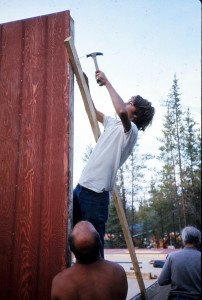 I started my work as a truck driver. I also knew some carpentry, so when we got to our destination of Foster Lake I worked with three Cree Native Americans to build a cabin for the Cousteau team to winter in. That’s where the team stayed to make the film Beavers of the North Country.
I started my work as a truck driver. I also knew some carpentry, so when we got to our destination of Foster Lake I worked with three Cree Native Americans to build a cabin for the Cousteau team to winter in. That’s where the team stayed to make the film Beavers of the North Country.
In late August I had to leave for my freshman year of college and feared I’d never have another chance for this kind of adventure.
Fortunately I had the opportunity to join Calypso a year and a half later. That was as a deck hand, the lowest rung on the totem pole. It was extremely hard work. Talk about 24/7!
That’s when I knew I wanted to become a diver and photographer. After the expedition I trained for that and subsequently advanced into that role. By the way, Calypso divers are also navigators. So you’re still pretty much 24/7.
Jeff: Diving takes people in many different ways. Some love the dangers of wrecks and the technology to dive deeper, while others are simply enthralled by the incredible marine life they can encounter. What attracted you to scuba diving?
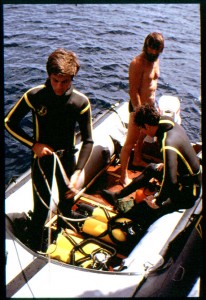 Richard: Well, I love water. I love the sea, being out to sea, and the life under the sea. I’m very interested in protecting the oceans and the creatures that rely on it. So to be a part of seeing and documenting the beauty, and to participate in creative adventurous educational storytelling, that’s what attracted me.
Richard: Well, I love water. I love the sea, being out to sea, and the life under the sea. I’m very interested in protecting the oceans and the creatures that rely on it. So to be a part of seeing and documenting the beauty, and to participate in creative adventurous educational storytelling, that’s what attracted me.
Jeff: When you became a member of the Calypso crew was it all you imagined and hoped it would be?
Richard: I don’t think I had expectations. I was pretty naïve, I just dove into the whole thing.
I certainly didn’t imagine what was actually the most intriguing aspect of the whole experience, the social element. Although the crew was primarily French, which would have been interesting enough, we had various other nationalities, including a Russian and a few Iranians, which contributed to the variety of religions, languages, diets, habits and attitudes. Particularly at such an impressionable age, 18-24, this was very impactful and not expected.
I don’t know if you have ever seen Calypso but if you saw it I think you’d be amazed at how small it is, only 139 feet long with a 25-foot beam. A flat bottomed, slow moving – top speed 11 knots, U.S.-built World War II wooden minesweeper, which slept 27. I probably didn’t expect that, or all the issues we had with the engines.
Nor did I expect the lovely Madame Simone Cousteau. Her nickname, La Bergere, means the Shepherdess. She was the real Captain. She’d mother us, discipline us, cut our hair and generally keep everybody in line.
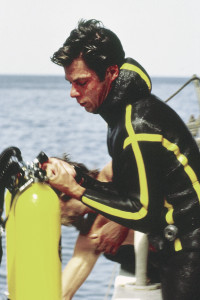 Jeff: I started diving in the late seventies and have witnessed the oceans become ever more overfished and polluted as each year passes. Has this affected you in any way?
Jeff: I started diving in the late seventies and have witnessed the oceans become ever more overfished and polluted as each year passes. Has this affected you in any way?
Richard: Well, sure. It concerns me, terribly. It struck me hard a few years back when I was diving some shallow reefs and they were dead. The people I was with didn’t even realize it. They’d see a beautiful fish and think everything was normal, but it wasn’t. The abundance of fish was gone and the coral was dead. Reefs and species are disappearing, forever.
I think the experience infected me, in a good way. At this point in my life I want to get more involved in some meaningful action and make a difference. That is my passion.
Jeff: How do you see the future of our seas? What should we be doing to protect and secure the future?
Richard: I’m no authority. There are incredibly talented well-educated people who can answer that far better than me. I do however think we’re in real trouble. Cousteau warned us, what 50 years ago? People continue to warn us and there are certainly some positive measures being taken. But there aren’t enough critical steps happening fast enough. Where do I start? Climate change, ocean acidification, pollution, ocean dumping, plastic, Fukushima, continued overfishing, shark finning, and the barbaric archaic slaughtering and capturing of whales and dolphins in the name of so-called false tradition and the almighty dollar, etc.
We’re already paying the price. If something doesn’t change, the ultimate price will jeopardize future generations and life on earth as we know it.
Jeff: Do you still dive?
Richard: I did not dive for many years. I was just too busy, burned out, spoiled by diving with the best on the best, and probably a little freaked out as the fellow who took my job on Calypso died on a dive.
I’m grateful to my new friend Bruce Cantrell who as I like to say “got me back in the water”. He invited me to join he and Jessica Fain during their successful attempt to live and work under the sea for 73 days in Jules’ Undersea Lodge. It’s the former La Chalupa Research Laboratory. I lived with them for 24 hours at about 30 feet deep. It was an amazing experience. Our webcast can be viewed here. My SCUBA blog entry about this experience can be viewed here.
I’d like to point out that after so many years away from diving, fortunately I did hire my friend Tim Thomas to give me a refresher. It was amazing how so much of it came right back to me. Tim familiarized me with the amazing new equipment, including the BC and the Octopus. Back in the day, BCs were inflated by a CO2 cartridge or your own breath. We didn’t have the Octopus, we’d buddy breath.
It was great to “get back in the water”.
Jeff: New technologies are ever advancing and constantly provide us with exiting new innovations in ways to explore the sea. Do you keep up to date with new possibilities or are you happy to simply don a basic scuba kit and enjoy being underwater?
Richard: I am now more knowledgeable about new technologies than I was a few years ago. I’ve learned a lot but I’ve only scratched the surface. It is incredible!
I get the opportunity to speak at dive conferences and other venues, which has been educational and intriguing. Of course during my time on Calypso the technology was primitive. And although Cousteau was the Chairman of U.S. Divers we typically didn’t use the state-of-the-art.
You’ll probably be amazed to know we didn’t use BCs. I was told, “leave your BC at home, we don’t use them”. Not a single BC on the ship. I didn’t wear a watch. Most of us didn’t have an air gauge. By the way, no spear guns on the ship either. Cousteau told me that at times he regretted co-inventing the Aqua-Lung due to the devastation that spearfishing had wrought.
Jeff: Can you recount one of your favourite times when you were with Cousteau?
Richard: Sure, there were two favourites.
First, when John Denver visited us in Belize. I didn’t even know who he was, which was a cool way to get to know him. He was already famous but I guess I was into different music. Anyway, John was a great man. He spent a lot of time with me when I was on the bridge on watch. I like to think I helped influence his writing of the song Calypso. We dove together and John gave us a wonderful concert on the deck of the ship. It made for a fun night and a great setting. John won an Emmy for the show, which featured the concert.
Second, diving on the wreck of the Civil War’s ironclad, the USS Monitor. That was off North Carolina. 230 feet on air! It was unbelievable. Unfortunately that expedition was cut short when we were hit by a freak storm. We were down to one of two engines, apparent sabotage, e.g. sugar in our fuel, so we had to retreat. There was not enough footage for television but making several dives was a favourite.
Jeff: TV has given us many undersea adventures and expeditions over the past ten to fifteen years and yet the Calypso seems to me to remain the most memorable and enduring. Would you agree? And if so, why do think that is?
Richard: I do think Calypso is a special ship. I credit Captain Cousteau. I think of Calypso as part of the brand. The ship, the videography, the music, the narration, the script, its all of that. That’s what made Calypso iconic.
You’re aware that she was accidentally rammed by a barge in Singapore in 1996 and sunk. Calypso was raised and eventually moved to France but the damage was done. It’s pretty well rotted away now and requires a total rebuild. To me that’s unrealistic.
Jeff: I can only imagine how working with the Coustau team must have taught you so many things about the world in which we live. If you could choose one thing, what would it be?
Richard: Take advantage of unforeseen opportunities. They may become a big part of your life.
Jeff: If there is one thing you hope readers of Frogmen will take from it, what would that be?
Richard: How about two things; inspiration and remembrance of Captain Cousteau?
Jeff: What’s your next project?
Richard: My Dad and I are writing a book about Cousteau. It will be great!
Jeff: Thanks Richard.
Frogmen is available now in soft cover & as an eBook.
For more information visit:
Gear News
Introducing the TR-80, IR-50 and CS-30 Regulators from DYNAMICNORD

Whether you are a beginner or a professional diver – with the three new main regulators from DYNAMICNORD, everyone will find their favourite regulator. They all look super stylish.
Excellent performance with the TR-80
Quality and performance are the be-all and end-all for regulators. It is not for nothing that the TR stands for Tec Reg. The innovative design of the TR-80 guarantees absolute reliability – even in ice-cold waters.

Perfect breathing effort at 0.8 J/l / certified for diving in waters below 10 degrees / structural design made of solid brass for best cold protection / membrane-compensated design with dry seal of the first stage / reduced exhalation effort thanks to optimized exhalation membrane and bubble deflector / adjustable Venturi (dive/predive) and adjustment knob for individual inhalation comfort / innovative design of the front cover prevents free-flow in strong currents or when diving with scooters / design made of sandblasted brass, matt chrome finish / 2 HP and 4 LP outlets / mouthpiece made of high-quality, anti-allergic silicone for maximum comfort.


Amazing underwater adventures with the IR-50
The IR-50 is the top regulator for advanced and experienced divers. Natural breathing is the essence of this regulator.

Ideal breathing effort at 0.8 J/l /certified for diving in waters below 10 degrees / compensated membrane / adjustable venturi (dive/predive) and adjustment knob for individual inhalation comfort/ outlet valve and deflector for minimum exhalation effort and reduction of bubbles on the face / design made of sandblasted brass, matt chrome finish / 2 HP and 4 NP outlets / mouthpiece made of high-quality, anti-allergic silicone for maximum comfort.


The Workhorse – our CS-30
For diving centres and diving beginners – the workhorse stands for strong construction, reliability and robustness. Perfect for your training.

Optimal breathing effort at 0.8 J/l /recommended for diving in waters above 10 degrees / non-compensated piston / adjustable venturi (dive/predive) / outlet valve and deflector for minimum exhalation effort and reduction of bubbles on the face / design made of sandblasted brass, matt chrome finish / 1 HP and 3 NP outlets / mouthpiece made of high-quality, anti-allergic silicone for maximum comfort.


Octopus OP-30
The OP-30 is the ideal addition to all DYNAMICNORD regulators. It is identical in construction to the CS-30.

The TR-80, IR-50, CS-30 (DIN & INT) regulators and the Octopus OP-30 are available from DYNAMICNORD dealers and in the online store.
DYNAMICNORD – Your Outdoor Companion.
Marine Life & Conservation
Paul Watson Released as Denmark Blocks Japan’s Extradition Bid

Renowned anti-whaling activist Paul Watson has been released from custody in Greenland after spending five months in detention. Denmark’s Justice Ministry rejected Japan’s request for his extradition, citing insufficient guarantees that his time already served in custody would be credited against any potential sentence.
The 74-year-old Canadian-American was arrested on July 21 in Nuuk, Greenland’s capital, when his ship docked to refuel. His arrest was based on a 2012 Japanese warrant related to a 2010 encounter in Antarctic waters. Japan alleged Watson obstructed operations and caused damage to a whaling research ship during efforts to disrupt illegal whaling. Watson has consistently denied these claims, maintaining his commitment to marine conservation.
Denmark, which oversees extradition matters for Greenland, concluded that while the legal conditions for extradition were met, the lack of assurances from Japan regarding time-served credit made extradition untenable.
In a video shared by his foundation, Watson expressed gratitude and relief, saying, “After five months, it’s good to be out… and good to know they’re not sending me to Japan.” He added that the most difficult part of his time in custody was being separated from his two young sons.
Watson is a pioneering figure in marine conservation, known for founding the Captain Paul Watson Foundation in 2022 after decades of activism with the Sea Shepherd Conservation Society. His bold efforts to defend marine life have earned him widespread support, including from celebrities and conservationists. His work has also been featured in the acclaimed reality TV series Whale Wars.
Watson’s lawyer, Jonas Christoffersen, praised the decision, stating, “We are happy and relieved that Paul Watson is now free.” He added that Watson is eager to reunite with his family and continue his vital work.
The arrest occurred while Watson’s vessel, the M/Y John Paul DeJoria, was en route to the North Pacific with a team of 26 volunteers to intercept a Japanese whaling ship. His foundation described the arrest as politically motivated and emphasized that Watson’s actions were focused on ending illegal whaling practices.
Japan resumed commercial whaling in 2019 after leaving the International Whaling Commission, asserting that whale meat is a cultural tradition. Conservationists, however, continue to challenge these practices, highlighting their impact on marine ecosystems.
Despite the challenges, Watson remains steadfast in his mission to protect marine life and bring attention to whaling practices. His dedication to ocean conservation has made him a globally respected advocate for the environment.
-

 News2 months ago
News2 months agoIconic SS United States to become the World’s Largest Artificial Reef
-

 News3 months ago
News3 months agoBook Review – 52 Assignments: Underwater Photography
-

 Gear News3 months ago
Gear News3 months agoDYNAMICNORD – New German diving brand enters the British market
-

 News3 months ago
News3 months agoExploring Cenote El Pit: A Diver’s Dream
-

 Gear News3 months ago
Gear News3 months agoTry BARE drysuits (and maybe even win one!) this Friday with Sea & Sea at North West Dive Fest
-

 Marine Life & Conservation3 months ago
Marine Life & Conservation3 months agoBook Review: Coral Triangle Cameos
-

 Blogs2 months ago
Blogs2 months agoDive the Egyptian Red Sea this Autumn with Regaldive
-

 News3 months ago
News3 months ago2024 Ocean Art Underwater Photo Competition Announced


